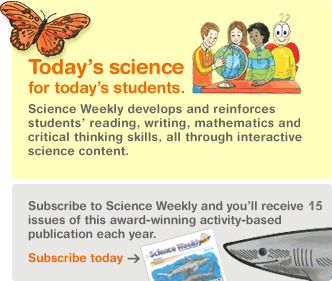Without going off on a tangent about global warming, global cooling, zero population growth, carbon dating, or any other scientific issue, let me just say that in general, I'm a huge fan of anything that makes science more accessible for kids, and for their parents and teachers.
So it was with high hopes I went into a review of a publication from Science Weekly. And it is with mixed opinions that I write this review.
What is it? Science Weekly is a little 4 page (8.5"x11") 'newspaper' that comes out 15 times per school year, in levels from K through grades 5/6. Each issue covers a different topic, most of them relating to science. Topics for this year included things like Pulleys, Scuba Diving, Fractions, and the Moon.
I received all six levels and the teacher's guide for the issue on Composting. I'm thrilled with that, as composting is something we've been wanting to start.
So, I ripped open my package, pulled the issues out, and eagerly took my first look. Rolled my eyes at the kindergarten level (Level Pre-A) but flipped through them all.
My first impressions -- I love the labs. I'm not so sure about most of the other activity content, at least not in the lower grades. So let me go through the levels we used in some detail. I made everyone get involved, so we used all but Level A (1st grade).
Level Pre-A (Kindergarten): the reading is a joke. The entire content: "Leaves can go in compost. Scraps can go in compost. Plants can grow better with compost." That's it. Trina (who won't be a kindergartner until fall) looked at me and said, "Is that all?" So we moved on to the activities -- okay, okay, full disclosure here. We moved on to her listening to the reading from Level D. Then we moved on to the activities in this level:
- We flipped to the inside. The first activity has her tracing the vowels in the vocabulary words: compost, plants, leaves, and scraps. And circling the word that doesn't contain an a.
- The next activity is the lab. I LOVE THIS! The lab has them putting some compost materials into a plastic bag and observing it over six weeks. Fabulous. Straightforward enough for a kindergartner to do fairly independently, and interesting.
- The next activity has her doing math. 9 leaves plus 6 apples (both the 9 and 6 are in dashed lines, so she doesn't even have to count the objects) = ____ things that can go in compost. Trina rolled her eyes at me.
- The next activity involves the child telling about what she ate today, and what things could go in compost. I like this idea.
- The final two activities involve looking at pictures, circling the items that can go in compost, or circling the compost pile. Trina thought these were pretty ridiculous too.
- writing the vocabulary words in alphabetical order.
- a calendar math activity that I really liked that involved counting days, weeks and months.
- a lab that is actually an experiment! Putting compost materials in plastic bags, varying their exposure to water and air, and watching AND RECORDING them over six weeks. Love, love, love this.
- and finally a couple word puzzle activities
- editing a short letter about composting
- an experiment! This one involves planting seeds in plain soil and in a soil/compost mixture and observing them over six weeks.
- a lab, including a hypothesis, and testing small vs. large pieces in composting. Love it.
- a writing assignment that we skipped
- a calendar based math activity that involved a lot of reasonably complicated stuff with questions about half as long, twice as long, etc. This is good.
- a word puzzle
- a vocabulary/word puzzle activity that results in sorting materials into green or brown categories
- a math activity involving converting temperatures from Fahrenheit to Celsius. I always like stuff like this.
- A lab to see how moisture and types of ingredients will affect composting speed. This includes a chart to track the results and see if your hypothesis was correct.
- A suggestion to go for a walk and look for natural composting
- a word puzzle
- vocabulary crossword puzzle
- a math activity converting inches into centimeters
- a lab involving 4 buckets of compost, looking for the differences that moisture, air and types of ingredients have, with a chart to keep track of appearance, smell and temperature.
- a challenge to put all "classroom" trash into a bag one day, then go through to see how much could be composted. What type of impact would composting have over the course of a year?
- a word puzzle
The Teaching Notes include an overview of the topic, which I think is vital for the younger levels, but not nearly so important for levels D & E. It also includes notes and answers for each level. It includes four book suggestions, and three websites about composting.
Available for $19.95 per student per year (for less than 20 students) or $4.95 per student per year if ordering 20 or more, you can check out the order form here. Plus a 10% shipping and handling charge. There is also a sample issue on this page.
My bottom line: First, I have only seen the one issue, and some sample issues online. So I'm making assumptions about the content with fairly limited information. I think the younger levels are overly simplistic and mostly busy-work, but the lab was good and very age appropriate. I love the labs/experiments throughout all of the levels. I like the older levels, though why everything has to include crossword puzzles or little code word puzzles is beyond me. My kids all enjoyed it for the most part. They'd have preferred fewer word puzzle types of activities.
If I had a co-op or other group where I could get the $4.95 rate, I would order subscriptions for 2011-12 for Thomas (Level E), Richard (Level B or C), and probably Trina (Level Pre-A, though she'd listen to the reading part from one or both of her big brothers' issues). At $19.95, however, I will not purchase two. I may subscribe to Level D and use it for all three of the younger kids. I cannot imagine a circumstance where I would think Level Pre-A or Level A was worth $22/year.
You can check
out what some of my fellow
crewmates had to say at:
Any
questions? I'd love to know what you would
want to know in deciding whether or not this is something you want to
purchase.
Disclaimer:
As part of the TOS Homeschool Review Crew, I did receive all levels of the composting issue of Science Weekly. The fact that I
received complimentary products does not guarantee a favorable review.
It does guarantee a review. A fair review. But I am not going to praise
something unless I think it deserves the praise. If I don't like it,
you'll hear that. And hopefully with enough detail as to why so you can
decide for yourself if what I hate about it makes it perfect for your
family. For more about my take on reviews, visit my blog post here.



3 comments:
This is a fantastic review, Debra. Very informative. I agreed with your assessment.
You know, we receive God's World News and see things like Weekly Reader from time to time, and I guess I was expecting something a bit more detailed and complete, with more scientific factoids...maybe longer (like the online interactive forms of Science Weekly).
My little kids (as usual) DID like having something just for them to do. The Pre-K worked for my 3 yo...not too much to do, and even if she couldn't read it, one of the older kids could with no trouble.
If the price was cheaper (like, if I had a co-op to buy mine through), I'd do it for them, but at 20 bucks a pop, there is no way I can afford that.
Blessings,
Heather
Debra, I said the same thing about the price.
I think if I were you, I would have used the Level A with your daughter, since Level Pre-A was above her.
I would like to have a subscription, but like you said, we would need a coop.
Maybe I will look into getting some ladies together.
Hi Debra,
FANTASTIC review! Honest and detailed. Really enjoyed reading it. Agree with you on the reading of the earlier levels. We did Levels C & D of THE FLU together as a family and enjoyed it. The labs / experiments were what the kids enjoyed most as well.
Blessings,
Post a Comment